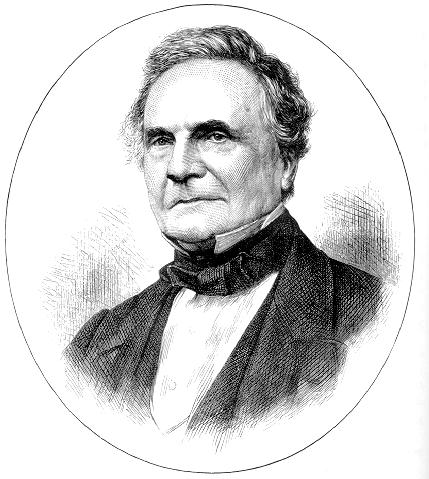History of Computers - Charles Babbage
--Wirvine 15:13, 7 October 2008 (CDT)By William Irvine
Charles Babbage, Born in Teignmouth, Devonshire in the United Kingdom on December 26, 1791, and died in 1871 in London. Babbage is known by some as "The Father of Computers" because of his Analytical Engine, which laid down the basic design for future computer.
Contents
Bio

Babbage's father was a rich man, and so Charles was able to attend the finest schools. The only restriction Babbage faced being his poor health. Babbage went to Trinity college in 1810, and there formed the Analytical society due to his disappointment with Trinity's math department. He transfered to Peterhouse, Cambridge in 1812 and was the best mathematician at the school. Unfortunately he did not graduate with honor, but received an honorary degree with no examination in 1814.
Babbage began to think about ways to remove human error from calculation, for he strongly disliked imprecision. on June 14, 1822, Babbage submitted a design to the Royal Astronomical Society for the "difference engine," which was a machine that would compute mathematical table. The government found it to be a good idea, and began funding the building of the machine. The difference engine was built with hundreds of hand tooled parts, many of which he himself designed. He took tours of industries to understand the process of making the parts, so his design would be better. After this he published On the Economy of Machinery and Manufacture in 1832, the first version of what would now be called operations research. Babbage also hired an extremely skilled tool maker and draftsman named Joseph Clement to oversee construction of the machine.
Returning from a trip through Europe in 1828 to prevent a breakdown after his wife, father, and infant son died, Babbage learned that his project had started to come under criticism from people who believed it could not work, or that it would be useless even if it did. Even so, the government continued its funding, although from this point on Babbage would have trouble getting more money. Babbage would also have to fight with Clement, who demanded more money and would not move operations into the the new building Babbage had built. Clement refused a request from Babbage that he take his money directly from the treasury, and stopped working all together. In addition, he refused to turn over the drawings and tools that were being used in the construction of the engine. Work on the engine halted in 1834, and the government officially ended the project in 1842.
From 1833 to 1842, Babbage began to think about and try and build a more advanced computing machine, the analytical engine, which would be able to be programmed to perform any kind of calculation, not just polynomials. He redirected the machines output to the input, which he described as the machine "Eating its own tail." The Analytical engine use punch cards, adapted from Jacquard's loom, for input and calculations. The machine consisted of the mill and the store; the mill would run instructions that it received from the store, which stored them. The mill, analogous to a modern processor, and the store, similar to a modern computers memory, formed the first multi-purpose computer. The Engine was 15 feet tall and 6 feet in diameter, and the digit store could stretch to 25 feet. Because of its monumental size and design, the complete machine was never completed.
Significance
Charles Babbage created what was in many way the first modern computer. His Analytical Engine held a proto-processor and memory, and could be "programmed" to carry out different equations and processes. This machine, though never completed, set the stage for the development of later computers of the 20th century.
Refrences
http://www.charlesbabbage.net/
http://ei.cs.vt.edu/~history/Babbage.html
http://www.projects.ex.ac.uk/babbage/biograph.html
Links
History of Computers - Joseph Jacquard
http://www.kerryr.net/pioneers/babbage.htm